Joe Biden
1974 All Over Again
Maureen Dowd refers to “Death and the All-American Boy”
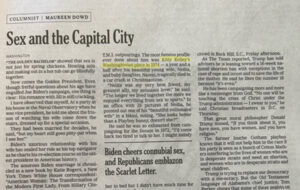
New York Times February 24, 2024, Maureen Dowd, “Sex and the Capital City”
June 1974 Washingtonian, Kitty Kelley, “Death and the All-American Boy” (link):
Queen of the Unauthorized Biography Spills Her Own Secrets
By Seth Abramovitch
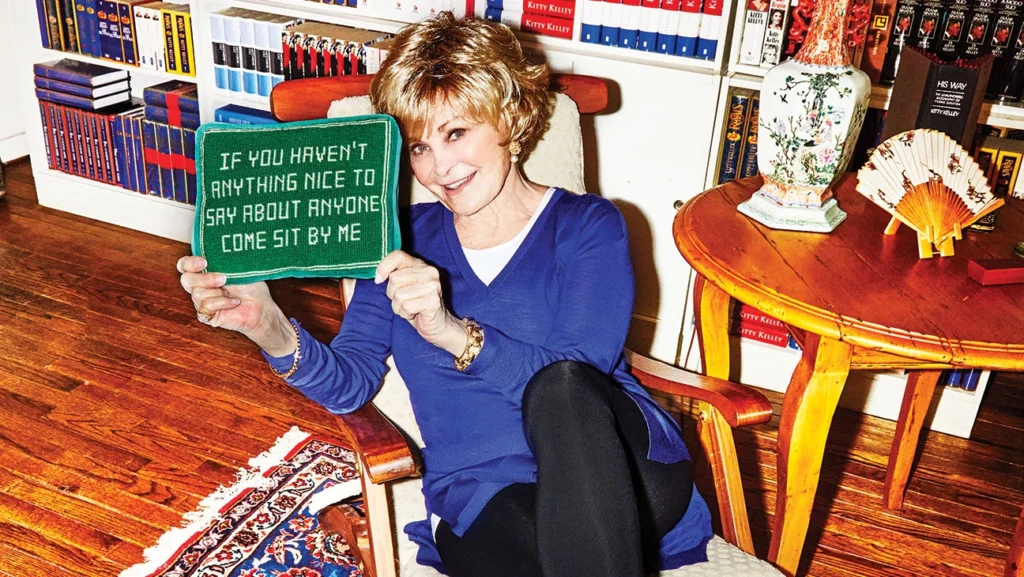
There was, not that long ago, a name whose mere invocation could strike terror in the hearts of the most powerful figures in politics and entertainment.
That name was Kitty Kelley.
If it’s unfamiliar to you, ask your mother, who likely is in possession of one or more of Kelley’s best-selling biographies — exhaustive tomes that peer unflinchingly (and, many have claimed, nonfactually) into the personal lives of the most famous people on the planet.
“I’m afraid I’ve earned it,” sighs Kelley, 79, of her reputation as the undisputed Queen of the Unauthorized Biography. “And I wave the banner. I do. ‘Unauthorized’ does not mean untrue. It just means I went ahead without your permission.”
That she did. Jackie Onassis, Frank Sinatra, Nancy Reagan — the more sacred the cow, the more eager Kelley was to lead them to slaughter. In doing so, she amassed a list of enemies that would make a despot blush. As Milton Berle once cracked at a Friars Club roast, “Kitty Kelley wanted to be here tonight, but an hour ago she tried to start her car.”
Only a handful of contemporary authors have achieved the kind of brand recognition that Kelley has. At the height of her powers in the early 1990s, mentions of the ruthless journo with the cutesy name would pop up everywhere from late night monologues to the funny pages. (Fully capable of laughing at herself, her bathroom walls are covered in framed cartoons drawn at her expense.)
Kelley is hard to miss around Washington, D.C. She drives a fire-engine red Mercedes with vanity plates that read “MEOW.” The car was a gift from former Simon & Schuster chief Dick Snyder, who was determined to land Kelley’s Nancy Reagan biography.
“Simon & Schuster said, ‘Kitty, Dick really wants the book. What will it take to prove that?’ ” she recalls. “I said, 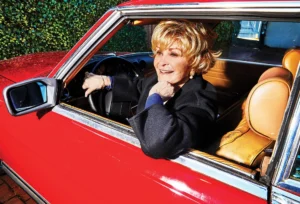 ‘A 560 SL Mercedes, bright red, Palomino interior.’ ‘We’ll be back to you.’ ” She insists she was only kidding. But a few days later, Kelley answered the phone and was directed to walk to the nearest corner: “Your bright red 560 SL is sitting there waiting for you.” Sure enough, there it was. The “MEOW” plates were a surprise gift from the boyfriend who would become her second husband, Dr. John Zucker.
‘A 560 SL Mercedes, bright red, Palomino interior.’ ‘We’ll be back to you.’ ” She insists she was only kidding. But a few days later, Kelley answered the phone and was directed to walk to the nearest corner: “Your bright red 560 SL is sitting there waiting for you.” Sure enough, there it was. The “MEOW” plates were a surprise gift from the boyfriend who would become her second husband, Dr. John Zucker.
Ask Kelley how many books she has sold, and she claims not to know the exact number. It is many, many millions. Her biggest sellers — 1986’s His Way, about Frank Sinatra, and 1991’s Nancy Reagan: The Unauthorized Biography, began with printings of a million each, which promptly sold out. “But they’ve gone to 12th printings, 14th printings,” she says. “I really couldn’t tell you how many I’ve sold in total.” She does recall first breaking into The New York Times‘ best-seller charts, with 1978’s Jackie Oh! “I remember the thrill of it. I remember how happy I was. It’s like being prom queen,” she says. “Which I actually was about 100 years ago.”
Regardless of one’s opinions about Kelley, or her methodology, there can be no denying that her brand of take-no-prisoners celebrity journalism — the kind that in 2022 bubbles up constantly in social media feeds in the form of TMZ headlines and gossipy tweets — was very much ahead of its time.
In fact, a detail from Kelley’s 1991 Nancy Reagan biography trended in December when Abby Shapiro, sister of conservative commentator Ben Shapiro, tweeted side-by-side photos of Madonna and the former first lady. “This is Madonna at 63. This is Nancy Reagan at 64. Trashy living vs. Classic living. Which version of yourself do you want to be?” read the caption. Someone replied with an excerpt from Kelley’s biography that described Reagan as being “renowned in Hollywood for performing oral sex” and “very popular on the MGM lot.” The excerpt went viral and launched a wave of memes. “It doesn’t fit with the public image. Does it? It just doesn’t. And the source on that was Peter Lawford,” says Kelley, clearly tickled that the detail had resurfaced.
While amplifying those kinds of rumors might not suggest it, in many eyes, Kelley is something of a glass-ceiling shatterer. “Back when she started in the 1970s, it was a largely male profession,” says Diane Kiesel, a friend of Kelley’s who is a judge on the New York Supreme Court. “She was a trailblazer. There weren’t women writing the kind of hard-hitting books she was writing. I’m sure most of her sources were men.”
But what of her methodology? Kelley insists she never sets out to write unauthorized biographies. Since Jackie Oh!, she has always begun her research by asking her subjects to participate, often multiple times. She is invariably turned down, then continues about the task anyway. She’s also known to lean toward blind sourcing and rely on notes, plus tapes and photographs, to back up the hundreds of interviews that go into every book.
“Recorders are so small today, but back then it was very hard to carry a clunky tape recorder around and slap it on the table in a restaurant and not have all of that ambient noise,” she says. To prove the conversations happened, Kelley devised a system in which she would type up a thank-you note containing the key details of their meeting — location, date and time — and mail it to every subject, keeping a copy for herself. If a subject ever denied having met with her, she would produce the notes from their conversation and her copy of the thank-you note.
So far, the system has worked. While many have tried to take her down, the ever-grinning Kelley has never been successfully sued by a source or subject.
Now 79, she lives in the same Georgetown townhouse she purchased with her $1.5 million advance (that’s $4 million adjusted for inflation) for His Way, which the crooner unsuccessfully sued to prevent from even being written.
Among the skeletons dug up by Kelley in that 600-page opus: that Ol’ Blue Eyes’ mother was known around 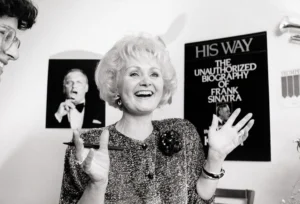 Hoboken, New Jersey, as “Hatpin Dolly” for a profitable side hustle performing illegal abortions. Sinatra’s daughter Nancy Sinatra said the family “strangled on our pain and anger” over the book’s release, while her sister, Tina, said it caused her father so much stress, it forced him to undergo a seven-and-a-half-hour surgical procedure on his colon.
Hoboken, New Jersey, as “Hatpin Dolly” for a profitable side hustle performing illegal abortions. Sinatra’s daughter Nancy Sinatra said the family “strangled on our pain and anger” over the book’s release, while her sister, Tina, said it caused her father so much stress, it forced him to undergo a seven-and-a-half-hour surgical procedure on his colon.
Giggly, vivacious and 5-foot-3, Kelley presents more like a kindly neighbor bearing blueberry muffins than the most infamous poison-pen author of the 20th century. “I seem to be doing more book reviewing than book writing these days,” she says in one of our first correspondences and points me to a review of a John Lewis biography published in the Washington Independent Review of Books.
She has not tackled a major work since 2010’s Oprah — a biography of Oprah Winfrey touted ahead of its release by The New Yorker as “one of those King Kong vs. Godzilla events in celebrity culture” but which fizzled in the marketplace, barely moving 300,000 copies. Among its allegations: that Winfrey had an affair early in her career with John Tesh — of Entertainment Tonight fame — and that, according to a cousin, the talk show host exaggerated tales of childhood poverty because “the truth is boring.”
“We had a falling out because I didn’t want to publish the Oprah book,” says Stephen Rubin, a consulting publisher at Simon & Schuster who grew close to Kelley while working with her at Doubleday on 2004’s The Family: The Real Story of the Bush Dynasty.
“I told her that audience doesn’t want to read a negative book about Saint Oprah. I don’t think it’s something she should have even undertaken. We have chosen to disagree about that.”
The book ended up at Crown. It would be nine months before Kelley would speak to Rubin again. They’ve since reconciled. “She’s no fun when she’s pissed,” Rubin notes.
Adds Kelley of Winfrey’s reaction to the book: “She wasn’t happy with it. Nobody’s happy with [an unauthorized] biography. She was especially outraged about her father’s interview.” She is referencing a conversation she had, on the record, with Winfrey’s father, Vernon Winfrey, in which he confirmed the birth of her son, who arrived prematurely and died shortly after birth.
But Kelley says the backlash to Oprah: A Biography and the book’s underwhelming sales had nothing to do with why she hasn’t undertaken a biography since. Rather, her husband, a famed allergist in the D.C. area who’d give a daily pollen report on television and radio, died suddenly in 2011 of a heart attack. “John was the great love of her life,” says Rubin. “He was an irresistible guy — smart, good-looking, funny and mad for Kitty.”
“Boy, I was knocked on my heels,” she says of Zucker’s death. “He hated the cold weather. He insisted we go out to the California desert. We were in the desert, and he died at the pool suddenly. I can’t account for a couple of years after that. It was a body blow. I just haven’t tackled another biography since.”
A decade having passed, Kelley does not rule out writing another one — she just hasn’t yet found a subject worthy of her time. “I can’t think of anyone right now who I would give three or four years of my life to,” Kelley says. “It’s like a college education.”
For fun, I throw out a name: Donald Trump. Kelley shakes her head vigorously. “I started each book with real respect for each of my subjects,” she says. “And not just for who they were but for what they had accomplished and the imprint that they had left on society. I can’t say the same thing about Donald Trump. I would not want to wrap myself in a negative project for four years.”
“You know,” I interrupt, “I’m imagining people reading that quote and saying, ‘Well, you took ostensibly positive topics and turned them into negative topics.’ How would you respond to that?”
“I would say you’re wrong,” Kelley replies. “That’s what I would say. I think if you pick up, I don’t know — the Frank Sinatra book, Jackie Oh!, the Bush book — yes, you’re going to see the negatives and the positives, which we all have. But I think you’ll come out liking them. I mean, we don’t expect perfection in the people around us, but we seem to demand it in our stars. And yet, they’re hardly paragons. Each book that I’ve written was a challenge. But I would think that if you read the book, you’re going to come out — no matter what they say about the author — you’re going to come out liking the subject.”
***
Kelley arrived in the nation’s capital in 1964. She was 22 and, through the connections of her dad, a powerful attorney from Spokane, Washington, she landed an assistant job in Democratic Sen. Eugene McCarthy’s office. She worked there for four years, culminating in McCarthy’s 1968 presidential bid. It was a tumultuous time. McCarthy’s Democratic rival, Robert F. Kennedy, was gunned down in Los Angeles at a California primary victory party on June 5. When Hubert Humphrey clinched the nomination that August amid the DNC riots in Chicago, Kelley’s dreams of a future in a McCarthy White House were dashed, and she decided a life in politics was not for her.
“But I remain political,” Kelley clarifies. “I am committed to politics and have been ever since I worked for Gene McCarthy. I was against the war in Vietnam. I don’t come from that world. I come from a rich, right-wing Republican family. My siblings avoid talking politics with me.”
In 1970, she applied for a researcher opening in the op-ed section at The Washington Post. “It was a wonderful job,” she recalls. “I’d go into editorial page conferences. And whatever the writers would be writing, I would try and get research for them. Ben Bradlee’s office was right next to the editorial page offices. And if he had both doors open, I would walk across his office. He was always yelling at me for doing it.”
According to her own unauthorized biography — 1991’s Poison Pen, by George Carpozi Jr. — Kelley was fired for taking too many notes in those meetings, raising red flags for Bradlee, who suspected she might be researching a book about the paper’s publisher, Katharine Graham. Kelley says the story is not true.
“I have not heard that theory, but I will tell you I loved Katharine Graham, and when I left the Post, she gave me a gift. She dressed beautifully, and when the style went from mini to maxi skirts —because she was tall and I am not, I remember saying, ‘Mrs. Graham, you’re going to have to go to maxis now. And who’s going to get your minis?’ She laughed. It was very impudent. But then I was handed a great big box with four fabulous outfits in them — her miniskirts.”
Kelley says she left the Post after two years to pursue writing books and freelancing. She scored one of the bigger scoops of 1974 when the youngest member of the upper house — newly elected Democratic Sen. Joe Biden of Delaware, then 31 — agreed to be profiled for Washingtonian, a new Beltway magazine.
Biden was still very much in mourning for his wife and young daughter, killed by a hay truck while on their way to buy a Christmas tree in Delaware on Dec. 18, 1972. The future president’s two young sons, Beau and Hunter, survived the wreck; Biden was sworn into the Senate at their hospital bedsides.
After the accident, Biden developed an almost antagonistic relationship to the press. But his team eventually softened him to the idea of speaking to the media. That was precisely when Kelley made her ask.
Biden would come to deeply regret the decision. The piece, “Death and the All-American Boy,” published on June 1, 1974, was a mix of flattery (Kelley writes that Biden “reeks of decency” and “looks like Robert Redford’s Great Gatsby”), controversy (she references a joke told by Biden with “an antisemitic punchline”) and, at least in Biden’s eyes, more than a little bad taste.
The piece opens: “Joseph Robinette Biden, the 31-year-old Democrat from Delaware, is the youngest man in the Senate, which makes him a celebrity of sorts. But there’s something else that makes him good copy: Shortly after his election in November 1972 his wife Neilia and infant daughter were killed in a car accident.”
Later, Kelley writes, “His Senate suite looks like a shrine. A large photograph of Neilia’s tombstone hangs in the inner office; her pictures cover every wall. A framed copy of Milton’s sonnet ‘On His Deceased Wife’ stands next to a print of Byron’s ‘She Walks in Beauty.’ “
But it was one of Biden’s own quotes that most incensed the future president.
She writes: ” ‘Let me show you my favorite picture of her,’ he says, holding up a snapshot of Neilia in a bikini. ‘She had the best body of any woman I ever saw. She looks better than a Playboy bunny, doesn’t she?’ “
“I stand by everything in the piece,” says Kelley. “I’m sorry he was so upset. And it’s ironic, too, because I’m one of his biggest supporters. It was 48 years ago. I would hope we’ve both grown. Maybe he expected me to edit out [the line about the bikini], but it was not off the record.” Still, she admits her editor, Jack Limpert, went too far with the headline: “I had nothing to do with that. I was stunned by the headline. ‘Death and the All-American Boy.’ Seriously?”
It would be 15 years before Biden gave another interview, this time to the Washington Post‘s Lois Romano during his first presidential bid, in 1987. Biden, by then remarried to Jill Biden, recalled to Romano, “[Kelley] sat there and cried at my desk. I found myself consoling her, saying, ‘Don’t worry. It’s OK. I’m doing fine.’ I was such a sucker.”
Kelley’s first book wasn’t a biography at all. “It was a book on fat farms,” she says, which was based on a popular article she’d written for Washington Star News on San Diego’s Golden Door — one of the country’s first luxury spas catering to celebrity clientele like Natalie Wood, Elizabeth Taylor and Zsa Zsa Gabor.
“On about the third day, the chef came out, and he said, ‘Would you like a little something?’ ” says Kelley. “He was Italian. I said, ‘Yes, I’m so hungry.’ And he kind of laughed. Turns out he wasn’t talking about tuna fish. I said, ‘You’ve got to be kidding me.’ He said, ‘I have sex all the time with the people here.’ I said, ‘I should tell you, I’m here writing a book.’ He said, ‘I’ll tell you everything!’ I warned him, ‘OK — but I’m going to use names.’ And I did.”
The book, a 1975 paperback called The Glamour Spas, sold “14 copies, all of them bought by my mother,” she says. But the publisher, Lyle Stuart, dubbed in a 1969 New York Times profile as the “bad boy of publishing,” was impressed enough with Kelley’s writing that he hired her in 1976 to write a biography of Jacqueline Kennedy Onassis.
The crown jewel of the book that would become Jackie Oh! was Kelley’s interview with Sen. George Smathers, a Florida Democrat and John F. Kennedy’s confidant. (After they entered Congress the same year and quickly became close friends, Kennedy asked Smathers to deliver two significant speeches: at his 1953 wedding and his 1960 DNC nomination.)
“It was quite explosive,” Kelley recalls of her three-hour dinner with Smathers. “He was very charming, very Southern and funny. And he said, ‘Oh, Jack, he just loved women.’ And he went on talking, and he said, ‘He’d get on top of them, just like a rooster with a hen.’ I said, ‘Senator, I’m sorry, but how would you know that unless you were in the room?’ He said, ‘Well, of course I was in the room. Jack loved doing it in front of people.’
“The senator, to his everlasting credit, did not deny it,” Kelley continues. “A reporter asked him, ‘Did you really say those things?’ And the senator replied, ‘Yeah, I did. I think I was just run over by a dumb-looking blonde.’ “
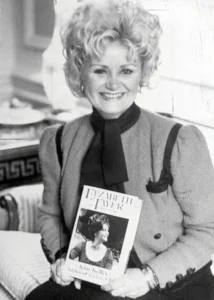 She followed that one, which landed on the New York Times best-seller list, with 1981’s Elizabeth Taylor: The Last Star, which underwhelmed. Her next two, however — His Way and Nancy Reagan: The Unauthorized Biography (for which she earned a $3.5 million advance, $9 million in 2022 adjusted for inflation) — were best-sellers, moving more than 1 million copies each in hardcover.
She followed that one, which landed on the New York Times best-seller list, with 1981’s Elizabeth Taylor: The Last Star, which underwhelmed. Her next two, however — His Way and Nancy Reagan: The Unauthorized Biography (for which she earned a $3.5 million advance, $9 million in 2022 adjusted for inflation) — were best-sellers, moving more than 1 million copies each in hardcover.
Her 1997 royal family exposé, The Royals — which presaged The Crown, the Lady Di renaissance and Megxit mania by several decades — contained allegations that the British royal family had obfuscated their German ancestry.
“Sinatra was huge and Nancy was huge, but The Royals gave me more foreign sales than I’ve ever had on any book,” Kelley beams, adding that the recent headlines about Prince Andrew settling with a woman who accused him of raping her as a teenager at Jeffrey Epstein’s compound “really shows the rotten underbelly of the monarchy, in that someone would be so indulged, really ruined as a person, without much purpose in life.”
“Looking around,” I ask Kelley, “is society in decline?”
“What a question,” she replies. “Let’s say it’s being stressed on all sides. I think it’s become hard to find people that we can look up to — those you can turn to to find your better self. We used to do that with movie stars. People do it with monarchy. Unfortunately, there are people like Kitty Kelley around who will take us behind the curtain.”
Contrary to her public persona, Kelley is known in D.C. social circles for her gentility. Judge Kiesel, a part-time author, first met her eight years ago when Kelley hosted a reception for members of the Biographers International Organization at her home.
“What amazed me was she was such the epitome of Southern hospitality, even though she isn’t from the South,” says Kiesel. “I remember her standing on the front porch of her beautiful home in Georgetown and personally greeting every member of this group who had showed up. There had to be close to 200 of us.”
Kelley hosts regular dinner parties of six to 10 people. “She likes to mix people from publishing, politics and the law,” says Kiesel. When Kiesel, who lives in New York City, needed to spend more time in D.C. caring for a sister diagnosed with cancer, Kelley insisted she stay at her home. “She threw a little dinner party in my honor,” Kiesel recalls. “I said, ‘Kitty — why are you doing this?’ She said, ‘You’re going to have a really rough couple of months and I wanted to show you that I’m going to be there for you.’ People look at her as this tough-as-nails, no-holds-barred writer — but she’s a very kind, sweet, generous woman.”
For Kelley, life has grown pretty quiet the past few years: “It’s such a solitary life as a writer. The pandemic has turned life into a monastery.” Asked whether she dates, she lets out a high-pitched chortle. “Yes,” she says. “When asked. No one serious right now. Hope springs eternal!”
I ask her if there is anything she’s written she wishes she could take back. “Do I stand by everything I wrote? Yes. I do. Because I’ve been lawyered to the gills. I’ve had to produce tapes, letters, photographs,” she says, then adds, “But I do regret it if it really brought pain.”
Says Rubin: “People think she’s a bottom-feeder kind of writer, and that’s totally wrong. She’s a scrupulous journalist who writes no-holds-barred books. They’re brilliantly reported.”
Before I bid her adieu, I can’t resist throwing out one more potential subject for a future Kelley page-turner.
“What about Jeff Bezos?” I say.
She pauses to consider, and you can practically hear the gears revving up again.
“I think he’s quite admirable,” she says. “First of all, he saved The Washington Post. God love him for that. And he took on someone who threatened to blackmail him. He stood up to it. I think there’s much to admire and respect in Jeff Bezos. He sounds like he comes from the most supportive parents in the world. You don’t always find that with people who are so successful.”
“So,” I say. “You think you have another one in you?”
“I hope so,” Kelley says. “I know you’re going to end this article by saying … ‘Look out!’ “
This story first appeared in the March 2 issue of The Hollywood Reporter magazine.
https://www.hollywoodreporter.com/lifestyle/arts/kitty-kelley-interview-unauthorized-biographies-1235101933/
Photo credits: top of page, Amy Lombard; Kitty Kelley in Merc, Amy Lombard; Kitty Kelly with His Way, Bettmann/Getty Images; Kitty Kelley with Elizabeth Taylor: The Last Star, Harry Hamburg/NY Daily News Archive/Getty Images
Joe Biden Interview by Kitty Kelley

Washingtonian magazine posted online Kitty Kelley’s “Death and the All-American Boy” (June 1974) as part of its 50th Anniversary collection.
The article attracted some new media attention.
See Gawker, Sept. 26, 2015.

See also the Huffington Post, Sept. 30, 2015.
